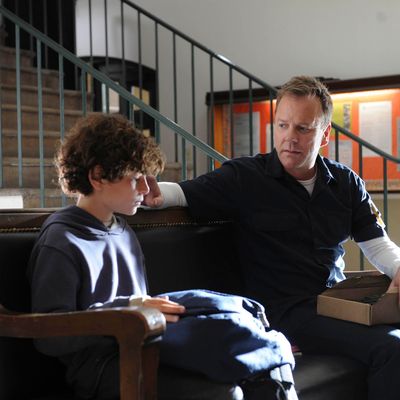
The premise of FoxÔÇÖs new drama Touch ÔÇö that thereÔÇÖs a connection between all people and things, and perhaps a scientific or mathematical way of understanding it ÔÇö appeals to me. I donÔÇÖt believe in non-rational or supernatural explanations for events, but I do think there are forces at work in the universe that our species is not evolved enough to understand. The biggest problem with the pilot of Touch, about a mute little boy with a numbers fetish who might be able to predict the future, is that it doesnÔÇÖt seem equipped to delve into that, even though it keeps hinting that it will. WhatÔÇÖs on the screen is a likable but dumb TV version of what the film scholar David Bordwell calls a ÔÇ£network narrativeÔÇØ ÔÇö an ensemble drama along the lines of Magnolia or Babel in which seemingly unrelated characters and subplots are joined by coincidence or fate. The show keeps threatening to become something more than that, but at the end of tonightÔÇÖs preview (future episodes of the series wonÔÇÖt air until March), it seems content to declare ÔÇ£IsnÔÇÖt life amazing?ÔÇØ and leave it at that.
The little boy is Jake Bohm (David Mazouz), an orphaned, 11-year old ÔÇ£special needsÔÇØ kid who might be autistic but is most definitely mute. HeÔÇÖs never said a word in his life, and when our story starts heÔÇÖs hugely troubled ÔÇö mysteriously so, given that heÔÇÖs obsessed with cell phones and keeps busting out of his school and climbing a nearby cell phone tower at exactly the same time every day, 3:18 p.m. Those digits prove significant. Numbers are at the center of JakeÔÇÖs personal mystery and mission. He keeps a journal consisting of nothing but digits inscribed in pencil in neat rows; it reminded me of the eerie printouts at the lab in Close Encounters of the Third Kind, a pop-culture echo that strengthens once we see a collection of JakeÔÇÖs cell phones arranged on the floor of his room in a whorl shape. Luckily JakeÔÇÖs dad Martin is played by Kiefer Sutherland, whose long stint on FoxÔÇÖs 24 ensures that we never doubt that the boy is in good hands and that his latent greatness and importance will be drawn out and and used to benefit humanity.
IÔÇÖll spare you a lengthy rundown of the plot, partly because itÔÇÖs so detailed that your eyes would roll up into your skull, and partly because it would spoil pretty much every twist in the premiere. Suffice to say that the pilot is organized around a particular (stolen) cell phone that gets passed from user to user, that it contains one-of-a-kind personal photos that are hugely important to its original owner, and that at some point in the story it touches the lives of different people in different countries, including the United States, Ireland, Japan, and Iraq, and that JakeÔÇÖs numbers obsession connects with it in a way that suggests the boy has the ability to predict the future.
Created by Tim Kring (Heroes), the series has an unabashedly Capra-eseque hokey-inspirational sensibility that feels more CBS than Fox (it could have been called Touched by a Mute Child Numbers Genius), and its photographed and edited with unusual flair. (Theres a marvelous focus shift late in the episode that would draw a collective Ahhhhh   if you were seeing it in a theater.) And I cant say a word against the central cast: Titus Welliver (Deadwood) as a lottery obsessive with a tragic backstory; Karen David as Kayla Graham, a call phone center worker with a brilliant singing voice; Danny Glover as a Arthur DeWitt, a professor who understands children with Jakes gift/affliction and tells Martin that the world is made up of ratios and patterns. If there were an Emmy category for Best Supporting Performance by an Actress in a Nearly Unplayable Part, Gugu Mbatha-Raw would be a lock as Child Protective Services worker Clea Hopkins, a tone-deaf pill who tries to take Jake away from his obviously loving father and pooh-poohs the notion that the kid is a quasi-messianic genius. (Its the William Atherton part from Ghostbusters as played by a nice lady.)
Although Sutherland is quite likable as a stressed-out, tenderhearted single dad, it took me a while to get used to the idea of him playing something other than a surly, lethal antihero; when WelliverÔÇÖs character scuffles with him, I half-expected Martin to jab a ballpoint into his neck and shriek, ÔÇ£WHERE IS THE BOMB?!?!?ÔÇØ Some of the regrettable subplots and incidental details donÔÇÖt exactly push against typecasting. I really donÔÇÖt know why Kring and company thought it was necessary to drag 9/11 into their story by making the boyÔÇÖs mother a casualty of the World Trade Center attack. (WeÔÇÖre fast approaching the day when the number of TV and movie characters who died on 9/11 will exceed the actual death toll.) And the Iraq story line, which revolves around a kid who wants to be a stand-up comic but gets sucked into becoming a suicide bomber, made my heart sink; whenever you see character of Middle Eastern origin in a major role, you can bet that within fifteen minutes theyÔÇÖll eventually be connected to terrorist violence. These, alas, are but a few of the showÔÇÖs misjudgments; a far bigger problem, from an audience-interest standpoint, is the way Kring and the writing staff lard the story with way, way, way too many personal tragedies and amazing twists of fate, to the point that, to misquote Rick in Casablanca, the worldÔÇÖs problems are reduced to a hill of beans. Even when a story makes a point of telling you that itÔÇÖs about coincidence, itÔÇÖs still possible to have too much of it.


